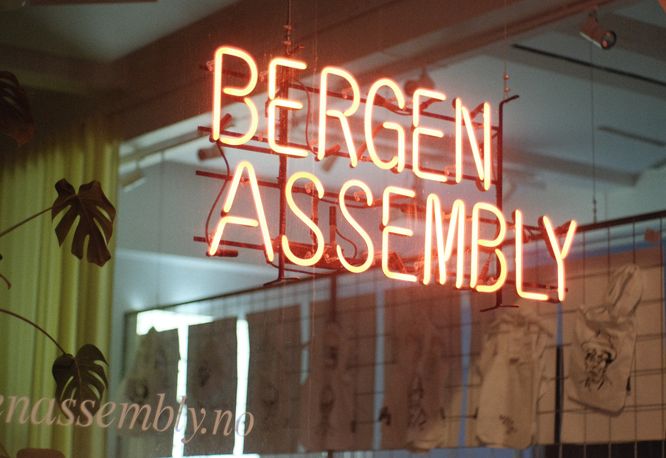Bergen Assembly announces Ravi Agarwal, Adania Shibli and Bergen School of Architecture as conveners of its 2025 edition
Aug 18, 2023

Press relase from Bergen Assembly:
| We are happy to announce Ravi Agarwal (an artist and researcher), Adania Shibli (a writer and visual culture researcher) and Bergen School of Architecture (BAS, an alternative educational institution) as joint conveners for Bergen Assembly´s fifth edition. Bergen Assembly is a platform for the arts devoted to supporting and exploring continuous artistic work, and develops an in-depth project that takes place in the city of Bergen every three years. Conveners join each edition and consider new ways to conceive of Bergen Assembly, allowing each iteration to take on distinctly different formats and ideas. For this upcoming edition of Bergen Assembly, Agarwal, Shibli and BAS are invited to reflect on the possibilities and impossibilities of the transformative shifts that inform our lived experiences and artistic practices. They aspire to engage in conversations that recognise a common desire to address the growing dissonance within their fields. Bergen Assembly was founded in 2011 to critically question how art is both created and experienced, and continuously explores new formats of artistic engagement. Its first edition, titled Monday Begins on Saturday, was convened by Ekaterina Degot and David Riff in 2013, and was organised as a narrative unfolding across exhibition spaces. The second edition, in 2016, was led by artist and composer Tarek Atoui with the freethought collective and the collaborative platform PRAXES, each of whom produced a distinct project. In 2019, the third edition, Actually, the Dead Are Not Dead, was convened by Iris Dressler and Hans D. Christ, who worked in collaboration with ten artists, curators, writers and activists to explore new notions of political assembly. The fourth edition, Yasmine and the Seven Faces of the Heptahedron, was convened in 2022 by the artist Saâdane Afif, and sought to offer a multiplicity of perspectives through seven enigmatic characters with correlative exhibitions. The current conveners have now started their collaboration, working towards the next edition of Bergen Assembly, which commences in 2025. Ravi Agarwal (Delhi,1958) is an artist, environmental campaigner, writer and curator. He addresses entangled questions through an interrelation of art, research and activism, focusing on the subject of nature and its futures. His work has been shown at major museums in solo and group exhibitions, and at international biennales. He has co-curated large public art exhibitions, including the Yamuna-Elbe project (Hamburg and Delhi, 2009) and Embrace our Rivers (Chennai, 2018). More recently he curated New Natures, A terrible beauty is born at the Goethe Institute and CSMVS Museum, Mumbai, and Imagined Documents at the Les Rencontres d’ Arles 2022. Agarwal is also the founding director of the environmental NGO Toxics Link and the founder of The Shyama Foundation, which engages with art and ecology practices in India. He has both written and edited books and journals, including The Crisis of Climate Change (Routledge, 2021), and Marg Journal of the Arts – Art and Ecology (Mumbai, April 2020) Adania Shibli (Palestine, 1974) has written novels, plays, short stories and narrative essays. Her novel Tafsil Thanawi (Minor Detail) was published by Al-Adab in 2017. Its English translation, published by Fitzcarraldo Editions (UK) and New Directions (US), was subsequently nominated for the National Book Award 2020 and the International Booker Prize 2021. She is currently the writer-in-residence at the Literaturhaus Zürich and Stiftung PWG. Alongside her fiction writing, Shibli is engaged in academic research, teaching and lecturing. She received a PhD in 2009 from the University of East London in the field of Cultural Studies. She has collaborated as a curator of artistic projects with institutions such as the A. M. Qattan Foundation in Palestine and Haus der Kulturen der Welt in Germany. Bergen School of Architecture (BAS) began in 1968 as a nomadic teaching model providing informal seminars, lectures, outdoor workshops and studio courses. This was formalised in 1986, with BAS gaining full rights to award Master’s degrees in 1990. BAS was founded as a pedagogic alternative to architectural education at the time. Its curriculum is grounded in Oskar and Zofia Hansen’s ideas about Open Form and the didactic methods developed at Warsaw Academy of Fine Arts from the 1950s to 1980s. Open Form encourages inclusive processes and ambiguous designs, developing spatial and temporal situations with diverse forms of collaboration and collective action. Over the years, BAS has created an important relationship with the North Western Coastal landscape and its building traditions. Situated in a former grain silo, the building is a testament to the school’s experimental approach to architecture and learning. Alongside hosting faculty and students, the silo also acts as a cultural arena for larger audiences, programming public events and exhibitions.  |
